Ensuring your rabbit gets enough water is crucial for their health and well-being. While these charming pets are adored for their playful behavior and sweet personalities, their hydration requirements often get overlooked. Proper hydration is essential for regulating body temperature, aiding digestion, and supporting various bodily functions. Like any other pet, rabbits depend on sufficient water intake to maintain optimal health, highlighting the need for responsible care from their owners.
This article will delve into the significance of water for rabbits, offering practical tips to encourage drinking and identifying common signs of dehydration. By understanding the hydration needs of their furry companions, rabbit owners can create an environment that promotes health and vitality. With the proper knowledge, they can ensure their bunnies thrive and enjoy long, happy lives filled with playful moments and loving companionship.
Ensuring Your Rabbit Gets Enough Water – Simple Tips for Happy Bunnies
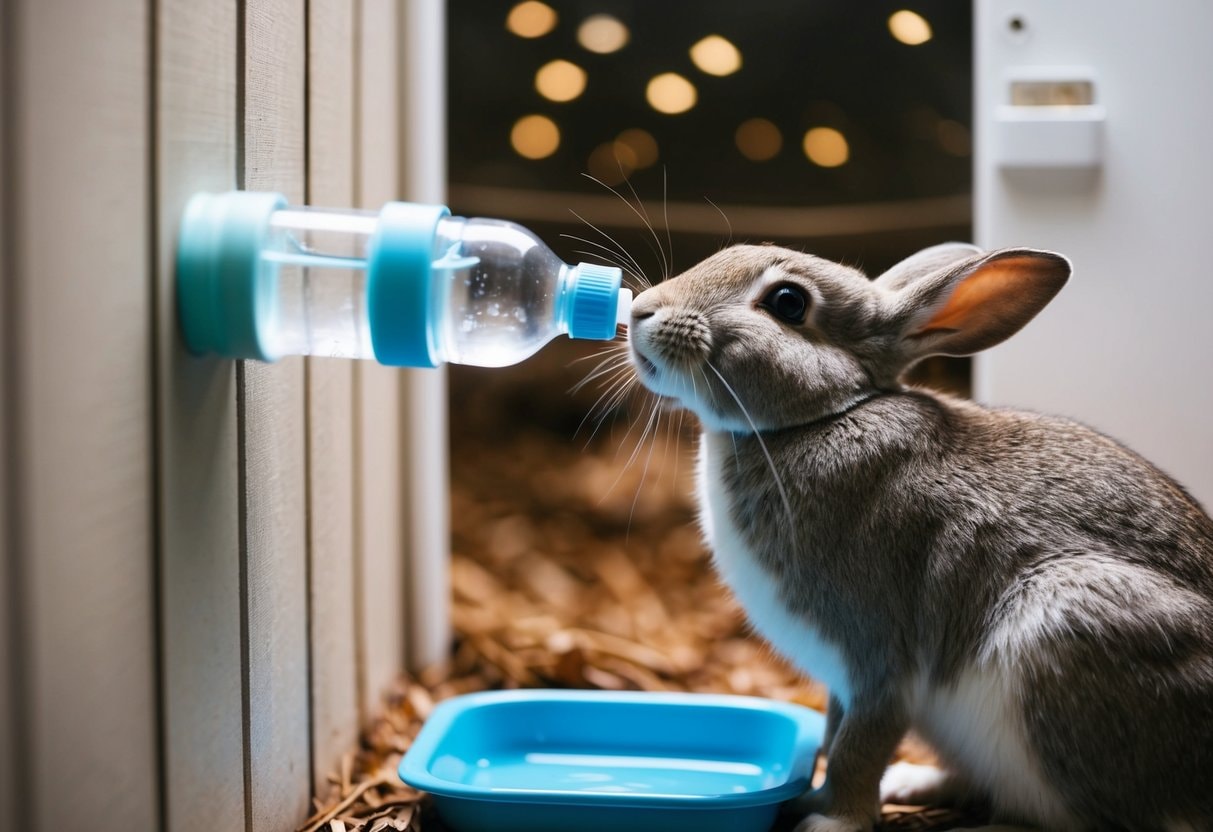
Keeping your rabbit hydrated is crucial to their health and happiness. Rabbits need water to stay healthy, just like any other pet. A rabbit should drink about 50-150 ml of water per kg of body weight daily. This helps them digest food, keep cool, and stay active. Getting your bunny to drink enough can be tricky. Some rabbits prefer water bowls, while others like bottles.
You can offer both options to see what your furry friend likes best. Clean, fresh water should always be available for your rabbit. There are fun ways to make drinking water more appealing to your rabbit. Add a few drops of fruit juice or ice cubes to their water bowl. These simple tricks can encourage your bunny to drink more and stay healthy.
Key Takeaways
- Rabbits need approximately 50-150 ml of water per kg of body weight daily, crucial for their overall health and well-being.
- Offering water bowls and bottles allows rabbits to choose their preferred drinking method, ensuring they stay hydrated. Clean, fresh water should always be available.
- Owners should watch for signs of dehydration in rabbits, including dry gums, lethargy, and decreased appetite. Prompt action is necessary if these signs are observed.
- Hydrating vegetables and fruits can enhance a rabbit’s fluid intake. Leafy greens and fruits like berries can provide additional moisture while being a tasty treat.
- Regularly check and clean water containers to prevent bacteria growth and ensure water quality. Monitoring your rabbit’s water intake can help identify potential health issues early on.
Understanding Rabbit Hydration
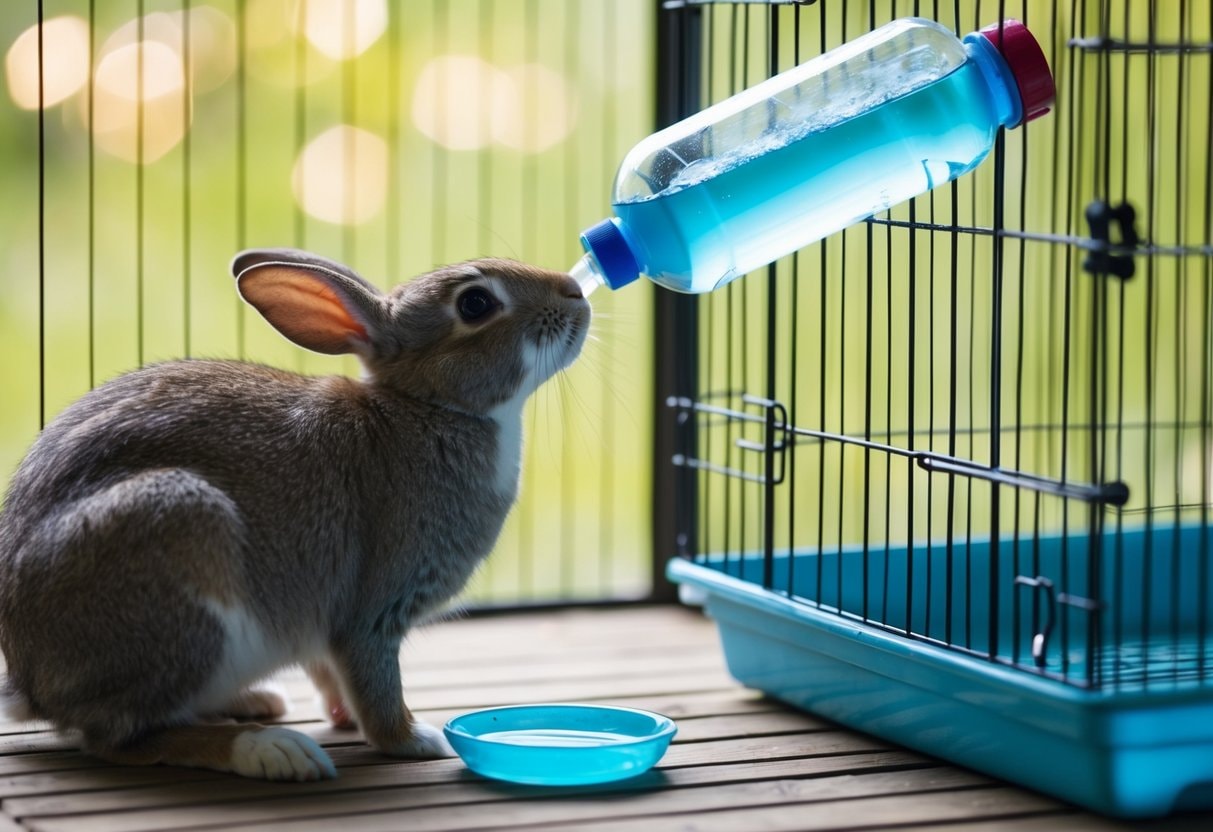
Water is vital for your rabbit’s health, so ensuring your rabbit gets enough water is essential. It helps with digestion, temperature control, and overall well-being. Explore why hydration matters and how to keep your bunny properly hydrated.
The Importance of Hydration for Rabbit Health
Water is key to your rabbit’s health. It makes up about 60-70% of their body weight. Proper hydration helps your bunny:
- Digest food.
- Keep cool.
- Remove waste.
- Maintain healthy organs.
Without enough water, your rabbit can get sick fast. Dehydration can lead to gut problems, kidney issues, and even heat stroke. Make sure your furry friend always has clean, fresh water. This simple step goes a long way in keeping them happy and healthy.
How Much Water Should a Rabbit Drink
Your rabbit needs more water than you might think. A good rule of thumb is 1-2 ounces of water per pound of body weight daily.
For Example:
- A 5-pound rabbit needs about 5-10 ounces of water.
- A 2-pound rabbit needs about 2-4 ounces.
Keep in mind these are just guidelines. Your rabbit’s exact needs may vary based on:
- Diet (dry food vs. fresh veggies).
- Activity level.
- Temperature.
- Health status.
To make drinking easier, offer both a bowl and a bottle. Some bunnies prefer one over the other.
Identifying Signs of Dehydration in Rabbits
Catching dehydration early is crucial. Look out for these signs:
- Dry, sticky gums.
- Sunken eyes.
- Thick, stringy saliva.
- Decreased urine output.
- Dark urine.
- Loss of skin elasticity.
- Lethargy or weakness.
To check skin elasticity, gently pinch the skin on your rabbit’s back. If it doesn’t snap back quickly, your bunny might be dehydrated. If you notice any of these signs, offer water right away. For severe cases, contact your vet immediately. They may need to give fluids to rehydrate your rabbit.

Did you Know?
Overhydration in rabbits is rare. Healthy rabbits usually don’t drink more than they need. If you’re worried, check with your vet. They can test for issues that might cause excess thirst.
Here’s an additional video on how to get your rabbit to drink more.
By: Kooky The Bunny
Hydration Sources and Techniques
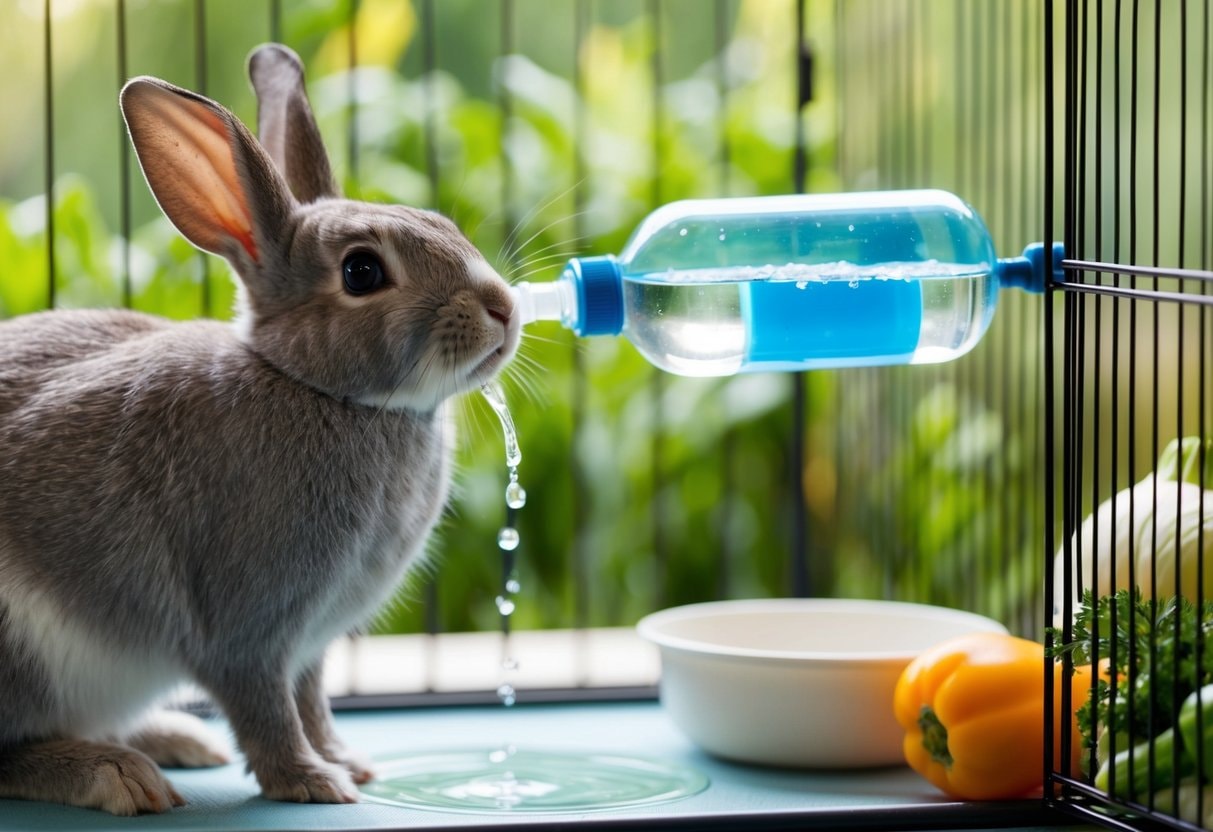
Keeping your rabbit well-hydrated involves more than just a water bottle. Ensuring your rabbit gets enough water requires exploring ways to provide fluids for your furry friend. Let’s explore the best methods to ensure your bunny stays healthy and hydrated!
Choosing the Right Water Bottle for Your Pet
The right water bottle can greatly affect your rabbit’s water intake. Look for bottles with a metal spout that’s easy to drink from. Avoid plastic ones that might leak or get chewed up. Check the bottle size. A medium-sized rabbit needs about 1-2 cups of water daily. Pick a bottle that holds enough for a day, with some extra.
Clean the bottle regularly. Wash it with warm, soapy water every few days. Rinse well to remove any soap residue. Make sure the bottle is at the right height. Your rabbit should be able to reach it easily without stretching too much.
The Role of Vegetables and Wet Foods in Hydration
Veggies aren’t just tasty treats – they’re great for hydration, too! Leafy greens like lettuce and celery have high water content. Try these veggie tips:
- Offer a variety of fresh veggies daily.
- Wash them well to remove dirt and pesticides.
- Introduce new veggies slowly to avoid tummy troubles.
Wet foods can also boost hydration. Some rabbits love pureed pumpkin or squash. These foods add moisture to their diet. Remember, veggies and wet foods shouldn’t replace fresh water. They’re just a yummy bonus!
Incorporating Fruits into Your Rabbit’s Diet
Fruits can be a sweet way to add extra water to your rabbit’s diet. But use them sparingly – they’re high in sugar!
Good fruit choices include:
- Apple slices (no seeds).
- Berries.
- Melon chunks.
Offer small pieces about the size of your thumb. Too much fruit can upset your rabbit’s tummy. Always introduce new fruits slowly. Watch for any signs of digestive issues. Fruits are treats, not main meals. Stick to giving them a few times a week at most.
Ensuring Accessibility to Fresh Water
Your rabbit needs easy access to fresh water all day long. Here’s how to ensure they get it: Place multiple water sources around their living area. Use both bottles and shallow bowls. Some bunnies prefer one over the other. Change the water daily, even if it looks clean. Rabbits are picky and won’t drink stale water.
In hot weather, add ice cubes to the water. This keeps it cool and fresh longer. Check water levels often. Refill as needed, especially on warm days when your rabbit might drink more. Clean water containers regularly. Use mild soap and rinse well. This prevents bacteria growth and keeps the water tasting good.
Ensuring Your Rabbit Gets Enough Water: Maintaining Hydration for Rabbit Well-Being
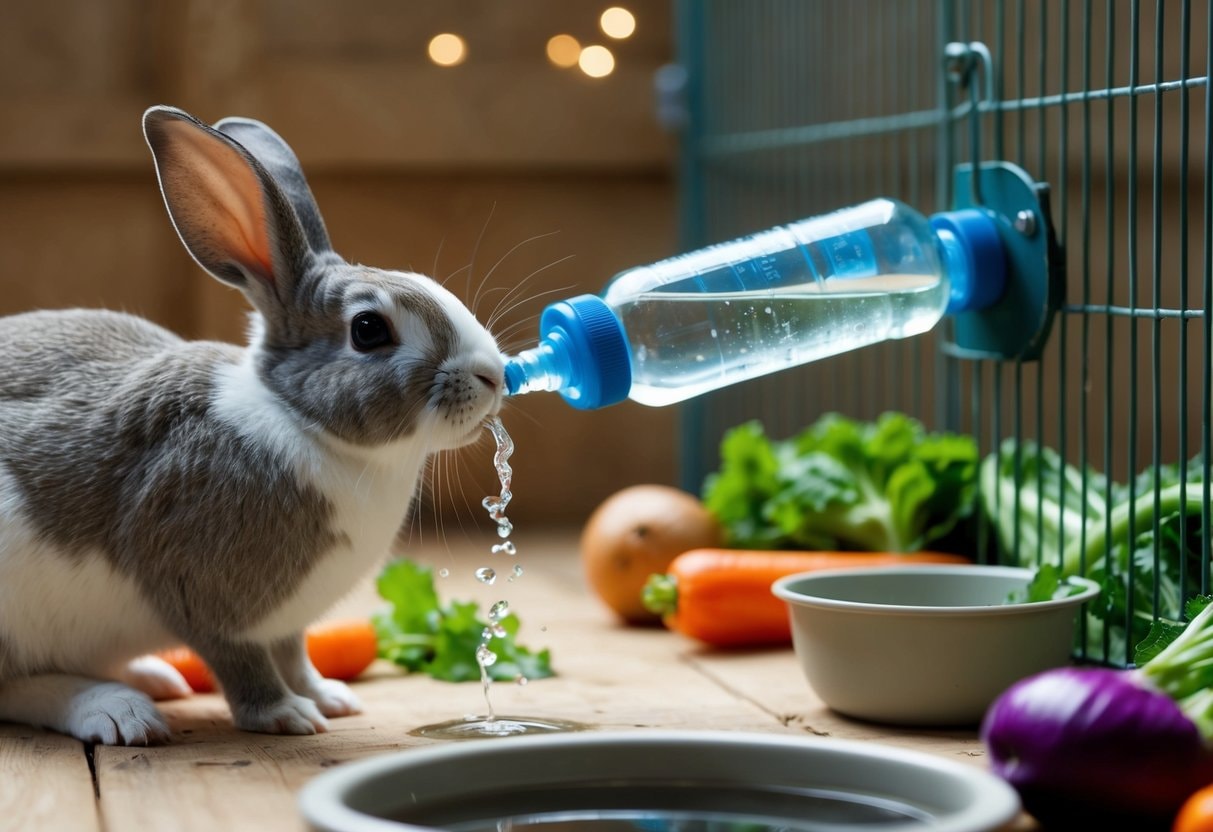
Keeping your rabbit hydrated is key to their health. Proper water intake helps prevent illness and keeps your furry friend happy.
Daily Hydration Monitoring for Your Rabbit
Check your rabbit’s water supply every day. Make sure they always have fresh, clean water available. Rabbits need about 1-2 ounces of water per pound of body weight daily. Use either a water bottle or a bowl. Some rabbits prefer bottles, while others like bowls.
Try both to see what your bunny likes best. Watch how much your rabbit drinks. If they’re drinking less than usual, it could be a sign of health issues. Look for signs that your rabbit is well-hydrated:
- Moist nose and eyes.
- Elastic skin (bounces back when gently pinched).
- Normal poop (round, dry pellets).
Preventing Dehydration-Related Health Issues
Dehydration can lead to severe problems in rabbits. Keep an eye out for these warning signs:
- Lethargy.
- Loss of appetite.
- Dry, sticky gums.
- Thick, stringy saliva.
If you notice these symptoms, offer your rabbit fresh water right away. You can also give them watery veggies like cucumber or lettuce. In hot weather, help your rabbit stay cool. Place a frozen water bottle in their enclosure for them to lean against.
Gastrointestinal stasis is a severe condition linked to dehydration. If your rabbit stops eating or pooping, call your vet immediately. Keeping your rabbit well-hydrated help prevent these health issues and ensure a happy, healthy bunny.
Best Practices for Consistent Hydration
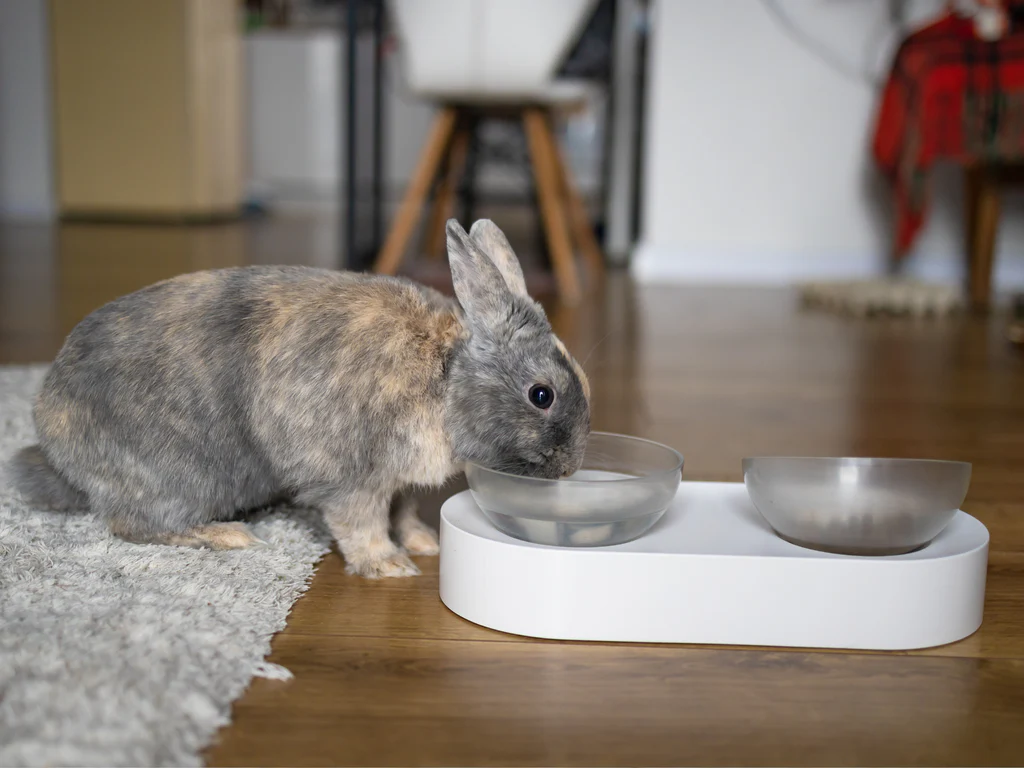
Keeping your rabbit hydrated is crucial for their health. A good setup and routine will help ensure they always have access to fresh water.
Setting Up a Hydration Schedule
Check your rabbit’s water twice a day. Refill in the morning and evening. This creates a routine and ensures they always stay supplied. Use both a water bottle and a bowl. Some rabbits prefer one over the other. Having both gives them options.
Place water containers in easy-to-reach spots. Put them away from food and litter areas. This keeps the water clean and encourages drinking. Monitor how much your rabbit drinks. Note any changes in their habits. Less drinking could signal health issues.
Proper Cleaning and Maintenance of Water Containers
Clean water containers daily. Use hot, soapy water and rinse well. This prevents bacteria growth. Scrub bottles with a bottle brush. Pay extra attention to the spout. Algae can grow there quickly. Wash water bowls in the dishwasher for a deep clean. Do this once a week.
Check for cracks or chips in containers. Replace them if damaged. Bacteria can hide in small crevices. Rinse and refill containers with fresh water daily. This keeps the water tasting good. Your rabbit will drink more. Use filtered water if your tap water has a strong taste or smell. Rabbits can be picky about water quality.
Here’s an additional video about rabbit hydration.
By: Pets Life
The Importance of Hydration: Ensuring Your Rabbit’s Health and Happiness
In conclusion, ensuring your rabbit gets enough water is fundamental to their health and happiness. Proper hydration is vital in supporting your rabbit’s digestive system, regulating body temperature, and maintaining overall well-being. By understanding your rabbit’s specific hydration needs—approximately 50-150 ml of water per kg of body weight daily—you can take proactive steps to encourage proper fluid intake.
To keep your rabbit hydrated, utilize a combination of water bottles and bowls, as some rabbits may prefer one over the other. Always provide fresh, clean water and consider incorporating hydrating vegetables and fruits into their diet. Monitoring your rabbit’s water consumption and ensuring they have access to hydration at all times can significantly enhance their overall quality of life.
Lastly, being vigilant for signs of dehydration is crucial. If you notice symptoms such as dry gums, lethargy, or decreased appetite, take immediate action to provide water and consult a veterinarian if necessary. With these practices in place, you can help your furry companion thrive with adequate daily hydration, ensuring they lead a happy and healthy life.
Frequently Asked Questions
How to Encourage a Rabbit to Drink More Water?
You can try a few tricks to get your rabbit to drink more. Put fresh veggies or fruit in their water bowl. Add ice cubes on hot days. Some bunnies like flavored water with a drop of juice. Offer both a bowl and a bottle. This gives your rabbit options. Keep the water clean and change it daily.
What Are the Signs of Dehydration in Rabbits?
Watch for dry, wrinkled skin. They may be dehydrated if you gently pinch your rabbit’s skin and it doesn’t snap back quickly. Other signs include less pee, small dry poops, and low energy. If you notice these, contact your vet right away.
What's the Daily Water Requirement for a Rabbit?
A rabbit needs about 50-150 ml of water per kg of body weight daily. This can vary based on diet and activity level. For example, a 2 kg rabbit might drink 100-300 ml water daily. Always have fresh water available.
Bowl or Bottle: What's Better for Rabbit Hydration?
Both bowls and bottles have pros and cons. Bowls are more natural but can get dirty quickly. Bottles stay clean but may be harder for some rabbits to use. It’s best to offer both. This lets your rabbit choose and ensures they always have a water source.
How Often Should I Check My Rabbit's Water Supply?
Check your rabbit’s water at least twice a day. Make sure it’s clean and full. Replace the water daily, even if it looks clean. Wash bowls and bottles regularly to prevent bacteria growth.
Join Us on Social Media and Share the Bunny Love!
Are you a bunny lover? So are we at The Rabbit Hop! Join us in our online community for:
Bunny Fun: Delight in adorable videos, explore fascinating facts, and find helpful tips to keep your bunny content!
Product Insights: Uncover the top-rated products perfect for your furry companion.
Bunny Community: Engage and connect with fellow bunny enthusiasts who share your passion.
Follow us on:



